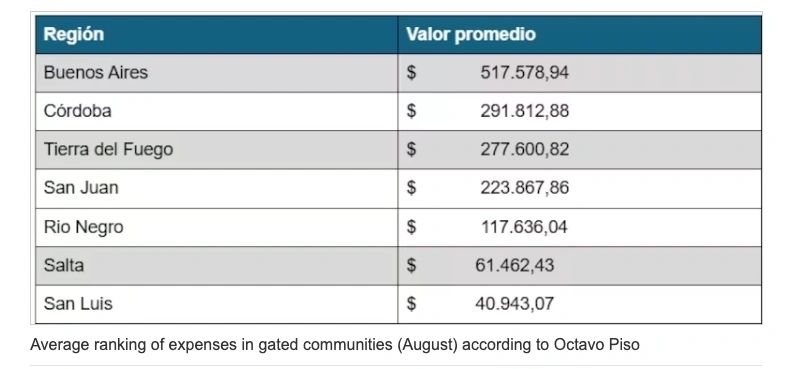BuySellBA
Administrator
HOA Fees Debt: What Happens If They Aren’t Paid and How to Prevent a Lawsuit - La Nacion Propiedades

Source:

 www.lanacion.com.ar
www.lanacion.com.ar
October 17, 2025
Late payment of expenses and the growing debt of consortia can lead to lawsuits against the owners.

The average late payment rate for expenses is 17%.Photo: Freepik - Freepik
Late payment of expenses and the indebtedness of consortiums have become an increasingly common problem. Non-compliance by owners generates a sustained increase in internal debt , which represents a challenge for both residents and administrators, as those who fail to regularize their payments can face legal proceedings and cause increases in debt for those who do pay to cover all expenses and obligations.
According to data from ConsorcioAbierto , in its latest report for September, the average expenditure on buildings in the City of Buenos Aires reached $$295,368 , with a monthly increase of 1.9% compared to August and a year-on-year increase of 41.7% .
On average, 17% of functional units are in arrears with their payments , a figure that has remained stable since 2024 in CABA and is replicated in the Province of Buenos Aires. The data collected by ConsorcioAbierto is from 12,000 buildings that use its platform.
However, according to data from the Octavo Piso platform, there is a slightly greater delay in gated communities , where the default rate reaches 18% , slightly exceeding that of building consortia.

Delinquency in payment of expenses is higher in gated communities than in buildings. Shutterstock
The amount each owner must pay is determined by the proportion of their unit in relation to the total building . In horizontal property, there are two types of expenses: ordinary expenses , which cover routine services and needs, and extraordinary expenses , which are intended for major repairs, equipment replacement, or contributions to reserve funds.
Albano Laiuppa, director of ConsorcioAbierto, affirms that the best way to avoid litigation is to act before the debt grows. “The administrator must maintain precise control over collections, evaluate payment alternatives, and communicate each step in a timely manner . Today, technology allows us to automate reminders, record agreements, and conduct real-time follow-up, which facilitates more agile and less conflictive management for everyone,” he noted.

Late payments in consortia, a problem for residents. Freepik
If a trial is reached, the process will consist of five main stages:
"The administrator has the obligation to pursue the collection of expenses, perhaps as the primary obligation, since expenses are, essentially, the lifeblood of the consortium. Without expenses, the system would collapse," explains Federico Chiesa, a lawyer specializing in horizontal property .
It's important to consider that each resident may be experiencing a unique situation because "no one stops paying their bills just because they want to. There's always a reason. The administrator must have a much deeper understanding of the members of that consortium, given the complexity that entails ," Chiesa points out.
Regarding the evolution of prices, in the Federal Capital, prices increased by 41.7% year-on-year in September . In the Province of Buenos Aires , the increase was 63.3% year-on-year .
Córdoba follows with an average of $129,524 , a 5.4% increase in September compared to August and a 53.6% year-over-year increase; Santa Fe with an average of $121,457 , an 8% monthly increase and a 49.5% year-over-year increase; and Entre Ríos among the lowest averages at $64,559 , but with a strong monthly increase of 13.1% and a year-over-year increase of 81.6%.
For its part, the Octavo Piso platform, which includes 24 national jurisdictions (23 provinces and CABA) and around 200,000 units, records the highest average expense in Neuquén with $251,964 per month in August, followed by Mendoza with $233,711, while CABA was at $208,056 in August .

Following behind are Córdoba, with an average of $291,812.88, and Tierra del Fuego, with $277,600.82. In Córdoba, costs increased by 22% during the period analyzed, while the provinces with the lowest prices include Río Negro, Salta, and San Luis.
Regarding late payments in gated communities , the Octavo Piso management platform reports that late payments for expenses are slightly higher than in buildings . While in apartments it remains at around 16%, in country clubs and gated communities it reaches 18%, with a significant peak of 26% reached in December of last year.
www.buysellba.com

Source:

Deuda de expensas: qué pasa si no se pagan y cómo prevenir un juicio
La morosidad en el pago de expensas y el creciente endeudamiento de los consorcios puede derivar en juicios contra los propietarios
October 17, 2025
Late payment of expenses and the growing debt of consortia can lead to lawsuits against the owners.

The average late payment rate for expenses is 17%.Photo: Freepik - Freepik
Late payment of expenses and the indebtedness of consortiums have become an increasingly common problem. Non-compliance by owners generates a sustained increase in internal debt , which represents a challenge for both residents and administrators, as those who fail to regularize their payments can face legal proceedings and cause increases in debt for those who do pay to cover all expenses and obligations.
According to data from ConsorcioAbierto , in its latest report for September, the average expenditure on buildings in the City of Buenos Aires reached $$295,368 , with a monthly increase of 1.9% compared to August and a year-on-year increase of 41.7% .
On average, 17% of functional units are in arrears with their payments , a figure that has remained stable since 2024 in CABA and is replicated in the Province of Buenos Aires. The data collected by ConsorcioAbierto is from 12,000 buildings that use its platform.
However, according to data from the Octavo Piso platform, there is a slightly greater delay in gated communities , where the default rate reaches 18% , slightly exceeding that of building consortia.

Delinquency in payment of expenses is higher in gated communities than in buildings. Shutterstock
The amount each owner must pay is determined by the proportion of their unit in relation to the total building . In horizontal property, there are two types of expenses: ordinary expenses , which cover routine services and needs, and extraordinary expenses , which are intended for major repairs, equipment replacement, or contributions to reserve funds.
From debt to judgment: what risks do homeowners run?
For property owners who fail to meet their monthly obligations , a lawsuit looms. The consortium, through the administrator, can initiate foreclosure proceedings to quickly collect an already overdue and documented debt. Ultimately, this can lead to a judicial auction of the property .Albano Laiuppa, director of ConsorcioAbierto, affirms that the best way to avoid litigation is to act before the debt grows. “The administrator must maintain precise control over collections, evaluate payment alternatives, and communicate each step in a timely manner . Today, technology allows us to automate reminders, record agreements, and conduct real-time follow-up, which facilitates more agile and less conflictive management for everyone,” he noted.

Late payments in consortia, a problem for residents. Freepik
If a trial is reached, the process will consist of five main stages:
- Start of trial (filing of enforcement action) : can be started without going through pre-trial mediation.
- Notification and transfer of claim: This is the execution of the order of payment, exceptions and seizure.
- Opposition of exceptions: if presented, the judge analyzes the validity of the defenses.
- Execution judgment: payment order that includes principal, interest, and costs.
- Forced execution: If the debt is not paid, it may result in the property being auctioned off.
"The administrator has the obligation to pursue the collection of expenses, perhaps as the primary obligation, since expenses are, essentially, the lifeblood of the consortium. Without expenses, the system would collapse," explains Federico Chiesa, a lawyer specializing in horizontal property .
It's important to consider that each resident may be experiencing a unique situation because "no one stops paying their bills just because they want to. There's always a reason. The administrator must have a much deeper understanding of the members of that consortium, given the complexity that entails ," Chiesa points out.
Where are the most expensive expenses paid in the country?
According to data from ConsorcioAbierto corresponding to September on 12,000 buildings surveyed on its platform, CABA leads the ranking with a monthly average of $295,398 , followed by the Province of Buenos Aires ($143,566).Regarding the evolution of prices, in the Federal Capital, prices increased by 41.7% year-on-year in September . In the Province of Buenos Aires , the increase was 63.3% year-on-year .
Córdoba follows with an average of $129,524 , a 5.4% increase in September compared to August and a 53.6% year-over-year increase; Santa Fe with an average of $121,457 , an 8% monthly increase and a 49.5% year-over-year increase; and Entre Ríos among the lowest averages at $64,559 , but with a strong monthly increase of 13.1% and a year-over-year increase of 81.6%.
For its part, the Octavo Piso platform, which includes 24 national jurisdictions (23 provinces and CABA) and around 200,000 units, records the highest average expense in Neuquén with $251,964 per month in August, followed by Mendoza with $233,711, while CABA was at $208,056 in August .
Costs in gated communities
When it comes to gated communities, the Province of Buenos Aires leads the way with an average of $517,000 per month , following a 13% increase between April and August (from $457,722.70 to $517,578.94).
Following behind are Córdoba, with an average of $291,812.88, and Tierra del Fuego, with $277,600.82. In Córdoba, costs increased by 22% during the period analyzed, while the provinces with the lowest prices include Río Negro, Salta, and San Luis.
Regarding late payments in gated communities , the Octavo Piso management platform reports that late payments for expenses are slightly higher than in buildings . While in apartments it remains at around 16%, in country clubs and gated communities it reaches 18%, with a significant peak of 26% reached in December of last year.
www.buysellba.com

